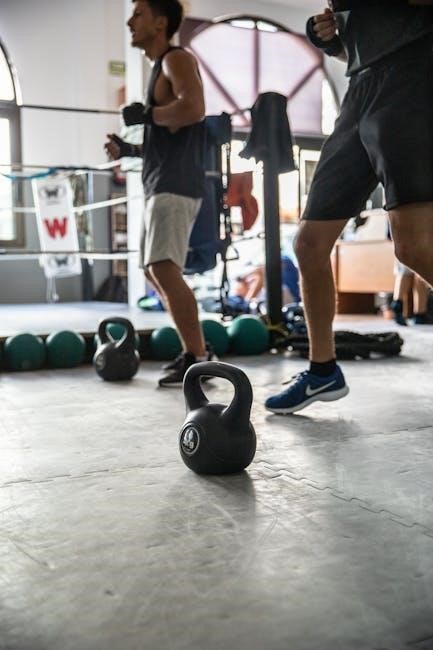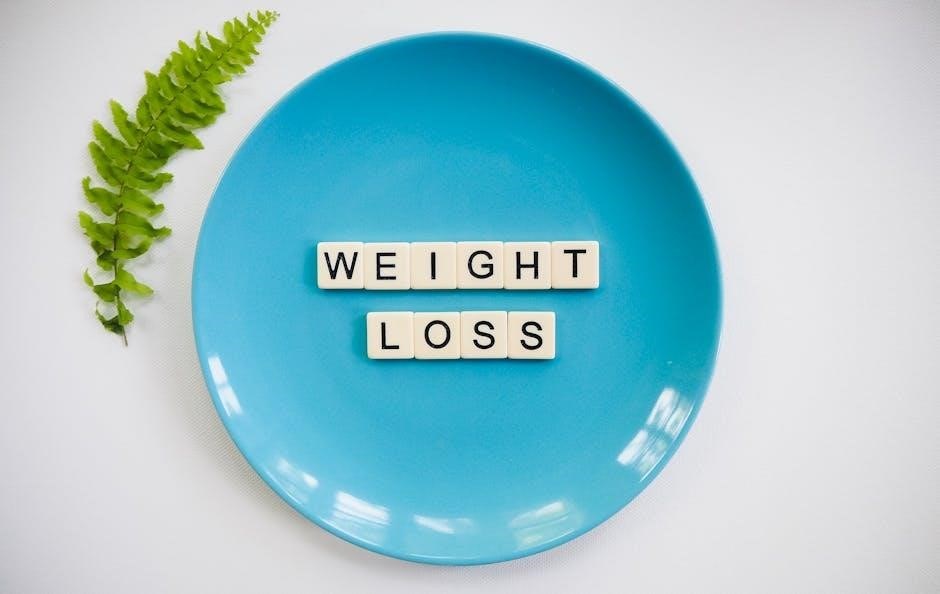A well-structured muscle gain diet plan is essential for building lean muscle mass. It focuses on consuming protein‚ complex carbs‚ and healthy fats to support growth and recovery. A calorie surplus‚ combined with consistent training‚ is crucial for optimal results. This section introduces the foundation of a diet tailored to muscle growth.
1.1 Importance of a Muscle-Building Diet
A muscle-building diet is critical for supporting muscle growth and recovery. It ensures your body has the necessary nutrients to repair and build tissues‚ maintaining an anabolic state. Protein‚ carbs‚ and healthy fats are essential for fueling workouts and promoting muscle synthesis. Without proper nutrition‚ even consistent training may fail to yield desired results. A well-structured diet plan helps optimize performance‚ enhance recovery‚ and achieve muscle gain goals effectively.
1.2 Overview of a 7-Day Diet Plan for Muscle Gain
A 7-day muscle gain diet plan is designed to provide a balanced intake of nutrients‚ ensuring your body has the fuel it needs to build and repair muscle tissue. The plan focuses on protein-rich foods‚ complex carbohydrates‚ and healthy fats‚ with an emphasis on maintaining a calorie surplus. Each day is structured to optimize nutrient intake‚ supporting muscle growth and recovery. The plan also incorporates variety to keep meals engaging and nutritionally diverse‚ ensuring sustained progress throughout the week.
Top Nutrition Mistakes That Stall Muscle Gain
Common nutrition mistakes include insufficient protein intake‚ neglecting carbohydrates‚ and inadequate meal frequency‚ all of which can hinder muscle growth and overall progress in body composition.
2.1 Insufficient Protein Intake
Inadequate protein intake is a common mistake that hinders muscle growth. Protein is essential for muscle repair and synthesis‚ requiring 1.6-2.2 grams per kilogram of body weight daily. Without sufficient protein‚ muscles cannot recover and grow effectively‚ leading to muscle breakdown and slower progress. Many individuals underestimate their protein needs or fail to distribute intake evenly throughout the day. This oversight can significantly stall muscle gain‚ emphasizing the importance of prioritizing high-quality protein sources in every meal to support muscle development and overall fitness goals.
2.2 Neglecting Carbohydrate Consumption
Neglecting carbohydrates can severely hinder muscle gain‚ as they provide the primary energy source for workouts and daily activities. Low carb intake often leads to fatigue‚ reducing training intensity and endurance. Additionally‚ insufficient carbohydrates can cause the body to break down muscle for energy‚ counteracting muscle-building efforts. Complex carbs‚ such as whole grains and vegetables‚ are vital for sustained energy and recovery. Ignoring this macronutrient can stall progress‚ making it essential to include balanced carbohydrate sources in meals to fuel muscle growth and overall performance effectively.
2.3 Inadequate Meal Frequency
Inadequate meal frequency is a common mistake that hampers muscle gain. Eating too infrequently can lead to prolonged fasting periods‚ causing muscle breakdown and reducing anabolic potential. While extreme meal frequencies aren’t necessary‚ ensuring 5-6 balanced meals throughout the day helps maintain a positive nitrogen balance and supports muscle synthesis. This approach prevents excessive muscle catabolism and keeps energy levels consistent for workouts. Proper meal timing also enhances nutrient absorption and metabolic efficiency‚ making it a critical factor in achieving muscle growth goals effectively.
Protein Intake for Optimal Muscle Growth

Protein is essential for muscle repair and growth‚ requiring a daily intake of 1.2-2.2 grams per kilogram of body weight. Proper timing and high-quality sources maximize results.
3.1 Recommended Daily Protein Consumption
For optimal muscle growth‚ the recommended daily protein intake is 1.2-2.2 grams per kilogram of body weight. This ensures adequate amino acids for muscle repair and synthesis. Higher intake supports advanced athletes or those with intense training. Distributing protein evenly across 5-6 meals maintains a positive nitrogen balance‚ crucial for growth. Quality sources like lean meats‚ fish‚ and legumes are ideal; Consistency is key‚ as insufficient protein stalls progress. Adjusting intake based on progress and goals ensures efficient muscle development.
3.2 Timing of Protein Intake
Protein timing plays a significant role in muscle growth. Consuming 30-50 grams of protein within 1-2 hours pre- and post-workout maximizes muscle synthesis. Spreading protein intake evenly across 5-6 meals maintains anabolic activity. A bedtime snack‚ such as casein protein‚ supports overnight recovery. Consistent timing ensures sustained muscle growth and repair. Properly timed protein intake aligns with training schedules‚ enhancing overall muscle-building efficiency.

3.3 Best Protein-Rich Foods for Muscle Gain
Chicken breast‚ lean beef‚ and fish like salmon are excellent protein sources for muscle growth. Eggs‚ Greek yogurt‚ and cottage cheese provide sustained protein release. Whey protein shakes are ideal for post-workout recovery. Tofu and legumes are great plant-based options. Incorporating these foods ensures a balanced intake of essential amino acids‚ promoting muscle repair and growth. Variety in protein sources helps maintain dietary interest and supports overall muscle-building goals effectively.
Balancing Macronutrients for Muscle Gain
Balancing carbs‚ protein‚ and fats is vital for muscle growth. Carbs provide energy‚ protein repairs tissues‚ and fats support hormone production‚ ensuring optimal muscle development.
4.1 Role of Carbohydrates in Muscle Building
Carbohydrates are the primary energy source for workouts‚ fueling strength and endurance. They replenish glycogen stores‚ preventing muscle fatigue and supporting recovery. Complex carbs‚ like whole grains and vegetables‚ provide sustained energy and fiber‚ aiding digestion. Without adequate carbs‚ workouts may suffer‚ and muscle growth could stagnate. Balancing carb intake with protein and fats ensures energy availability and supports anabolic processes‚ making them indispensable for muscle building.
4.2 Importance of Healthy Fats
Healthy fats are essential for hormone production‚ which plays a crucial role in muscle growth and recovery. They also aid in the absorption of fat-soluble vitamins‚ such as vitamins A‚ D‚ E‚ and K‚ which are vital for overall health. Sources like avocados‚ nuts‚ and olive oil provide sustained energy and support metabolic functions. While fats are calorie-dense‚ they are necessary for maintaining optimal bodily functions and ensuring muscle-building processes operate efficiently.
4.3 Maintaining a Calorie Surplus
Maintaining a calorie surplus is critical for muscle gain‚ as it provides the energy needed for muscle growth and recovery. A surplus ensures your body has enough fuel to build and repair tissues. Aim for an additional 250-500 calories above your maintenance level‚ depending on activity and goals. Focus on nutrient-dense foods to avoid excessive fat gain. Tracking your intake helps ensure you stay in a surplus while supporting lean muscle development. Consistency is key‚ as muscle growth requires time and a sustained calorie surplus.
Sample 7-Day Meal Plan for Muscle Gain
This structured‚ nutrient-dense plan provides balanced meals rich in protein‚ carbs‚ and fats to fuel muscle growth. It’s divided into two parts for clarity and variety.
5.1 Day 1-2: High-Protein and Complex Carbohydrate Meals
Start your week with meals rich in lean proteins and complex carbs to fuel muscle growth. Breakfast options include scrambled eggs with whole-grain toast or oatmeal with nuts and berries. Snacks like Greek yogurt or a protein smoothie keep energy levels steady. Lunches focus on grilled chicken or fish paired with brown rice‚ quinoa‚ or sweet potatoes. Dinners feature lean beef or turkey with steamed vegetables. These meals provide a balanced mix of nutrients to support muscle recovery and growth‚ ensuring you meet your daily protein goals while maintaining sustained energy levels throughout the day.
5.2 Day 3-4: Incorporating Healthy Fats and Fiber

Days 3 and 4 focus on adding healthy fats and fiber to your meals for enhanced nutrition and muscle support. Breakfast includes avocado toast with poached eggs or a smoothie with almond butter and spinach. Lunches feature grilled salmon or tofu with quinoa and mixed vegetables. Snacks like nuts or chia seeds provide a fiber boost. Dinners include lean meats or plant-based proteins paired with whole grains and steamed greens. These meals ensure a balanced intake of fats and fiber‚ promoting better digestion‚ hormone production‚ and sustained energy levels for optimal muscle growth and recovery.

5.3 Day 5-7: Adjusting Caloric Intake for Optimal Growth
Days 5-7 focus on fine-tuning your caloric intake to ensure continuous muscle growth. Increase your daily calories slightly by adding healthy fats or complex carbs to meals. Monitor your weight and adjust portions if needed. Balanced macronutrient intake remains crucial‚ with protein at the forefront. Example meals include grilled chicken with sweet potatoes‚ fatty fish like salmon‚ or plant-based options like lentils with brown rice. Incorporate vegetables and whole grains to maintain fiber intake. This period ensures your body remains in a calorie surplus while avoiding excessive fat gain‚ promoting lean muscle development and recovery.